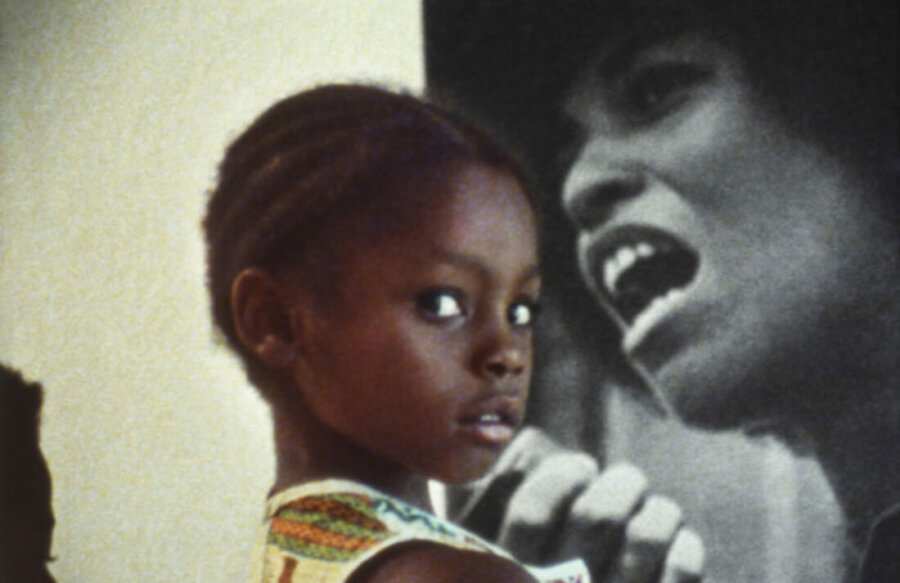
Cinema
Hailé Gerima
From 04 to 25 April 2017
Jeu de Paume – Paris
From the battles and destinies of Blacks in the American ghettoes to the torments and struggles of the Ethiopian people, every film made by Haile Gerima relates a coming to awareness. In each case, this consciousness comes about at the point where the violence of oppression is no longer perceived as a fatality, when the need to think and act overrides resignation, or amnesia gives way to memory.
Whether they face racial or class-based violence (Harvest: 3000 Years, Bush Mama, Ashes and Embers), or are lost in the maze of an obscured identity (Sankofa, Teza), Gerima’s figures set out to reclaim their lives. They declare a veritable war of liberation with a world that stifles and enslaves, and the reconstruction of a memory hidden or distorted by colonial, social and racial domination is a decisive step towards emancipation.
Just as his documentary narratives examine struggle, be it for civil rights (Wilmington 10 – USA 10,000) or the emblematic African victory over colonialism (Adwa – an African Victory), Gerima’s fictions choose rebellion and resistance rather than lament, the reaction to violence rather than indulgence in victimhood.
Born in Ethiopia and now living in the United States, Gerima defines himself as an “engaged, third-world independent filmmaker.” His work ceaselessly probes the hidden realities of his characters and their environment, going beyond the narrative and figurative stereotypes used to portray Blacks and “minorities” in Hollywood cinema.
The language of Gerima’s films, or what he calls their “accent,” is never naturalist or reducible to codes and genres. His experimental approach melds together documentary precision, the freedom and commitment of non-professional actors, direct speech to the viewer, the conflation of different places and time frames, and the intensity of dream or visions – yet never to the detriment of rigour. This is an African filmmaker taking it upon himself to tell his stories and his history in the language he chooses. This language is also made up of sound compositions: everyday dialogues and quotations, sung stories and jazz riffs, inner voices and noises from the world compose a choir that accompanies and comments on the inner world of the characters. It is surely no surprise, therefore, that some of these films originated in dreams and visions – Angela Davis handcuffed for Child of Resistance, eyes watching through sugar cane stalks in Sankofa… –, especially if we bear in mind how this cinema works to make visible (at last) the inner worlds of these men and these women finally emancipated from the clichés of a history that they no longer identify with.
Here we could no doubt see the effect some of the influences from Gerima’s formative years and recognise, for example, the imprint of the Latin-American “third cinema” and of the “new world cinemas” in the emphasis on autonomous expression by peoples achieving independence. Not the least of these shared features is the intransigent insistence on independence found throughout Gerima’s practice. Deliberately turning his back on the American cinema “system,” the filmmaker puts long, gruelling hours of work into the making of his films, hampered as he is by meagre budgets and struggling to cope with the lack of resources, and finally battling, one cinema at a time, to get the work distributed.
Gerima continues to make films. This cycle provides an opportunity to discover the coherence and power of a passionate, generous filmmaker whose voice always resonates in the present.
Marie-Pierre Duhamel-Muller
Programming: Marie-Pierre Duhamel-Muller
A teacher of film studies and translator, Marie-Pierre Duhamel-Muller has sat on the selection committees for film festivals such as Pesaro, Locarno, Venice and Rome, and directed the Cinéma du Réel festival.
Partners
Cycle in partnership with
Cinéma du Réel festival and CINEMATEK,
with the collaboration of Courtisane and DISSENT !
PROGRAMME
Tuesday 4 April, 7 pm
Opening evening at Jeu de Paume with Haile Gerima and Marie-Pierre Duhamel.
Hour Glass, United States, 1971, 8 mm, black-and-white and colour, 13 minutes.
Bush Mama, United States, 1975, 16 mm, black-and-white, 98 minutes.
Wednesday 5 April, 6 pm
The Harvest: 3000 Years, Ethiopia – United States, 1976, 16 mm, black-and-white, 137 minutes.
Screening followed by a discussion with Haile Gerima.
Friday 7 April, 6 pm
Sankofa, United States – Ghana – Burkina Faso – Germany – UK, 1993, 35 mm, colour, 125 minutes.
Screening followed by a discussion with Haile Gerima.
Saturday 8 April, 2 pm
Wilmington 10 – USA 10,000, United States, 1979, 16 mm, colour, 120 minutes.
Screening presented by Marie-Pierre Duhamel. First presentation in France.
Saturday 8 April, 16 h 30
Ashes and Embers, United States, 1982, 16 mm, colour, 129 minutes.
Tuesday 18 April, 7 pm
Adwa – an African Victory, United States – Ethiopia – Germany, 1999, 35 mm, black-and-white and colour, 97 minutes.
Friday 21 April, 6 pm
Teza, Ethiopia – Germany – France, 2008, 35 mm, colour, 140 minutes, French subtitles.
Saturday 22 April, 2 pm
Ashes and Embers, United States, 1982, 16 mm, colour, 129 minutes.
Saturday 22 April, 16 h 30
Child of Resistance, United States, 1972, 16 mm, black-and-white and colour, 35 minutes.
Bush Mama, United States, 1975, 16 mm, black-and-white, 98 minutes.
Tuesday 25 April, 6 pm
Teza, Ethiopia – Germany – France, 2008, 35 mm, colour, 140 minutes, French subtitles.
